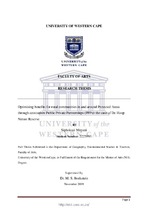| dc.description.abstract | Recent years have seen an upsurge of interest from governments and development
organisations in adopting the Public Private Partnership (PPP) approach when developing and
operating ecotourism projects. A PPP is a contract between a public sector institution and a
private party, in which the private party assumes substantial financial, technical and operational
risk in the design, financing, building and operation of a project (South African National
Treasury 2004). Countries such as India, China and Kenya have developed numerous projects
through PPPs. Protected Areas have followed suit in adopting the PPP approach, to be able to
focus on their core business, namely conservation. To date, relevant research on PPP
ecotourism projects, specifically pro-poor tourism approach is fragmented, limited in scope,
and lacks examples that can assist practitioners in embedding pro-poor tourism principles in
the PPP methodology. Academically, studies are largely evaluations that compare progress
against projects’ defined objectives or broad based sustainable tourism goals. However, this
study is an assessment of a tourism development from a pro-poor tourism perspective. Thus,
this study interrogated the extent to which ecotourism PPP at De Hoop is pro-poor.
Furthermore, the study sought to establish if rural local communities living in and near De
Hoop PPP benefit and how their benefits can be enhanced. Pro-poor tourism indicators are used
in this study as a theoretical base to evaluate De Hoop PPP. | en_US |

